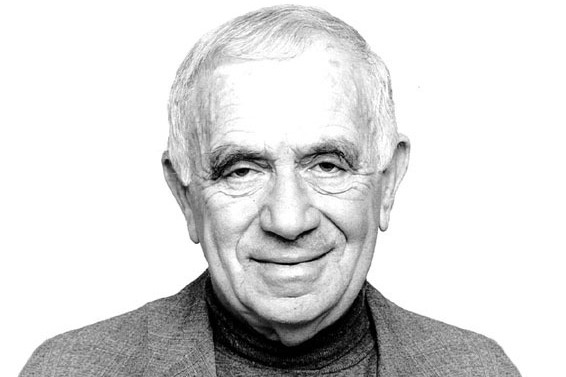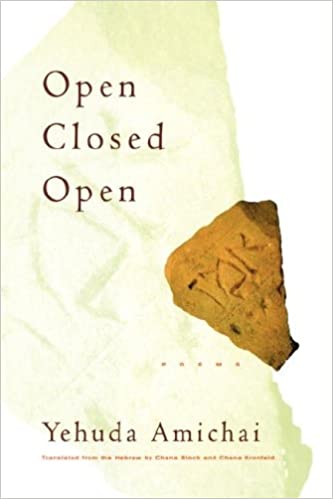
Yehuda Amichai (1924-2000) is a writer with an international reputation. He was born in Germany and emigrated with his parents to Palestine in 1936. Best known for his poetry, he is the recipient of numerous awards, including the Israel Prize, his country’s highest honor. Open Closed Open was published in Israel in the original Hebrew in 1998.

Judges’ Citation
These last poems by the greatest Israeli poet of the modern era are marked by the humanity and humor, which have always characterized his work.
Selected poems
by Yehuda Amichai
2
We lived in many houses and left remnants of memory
in every one of them: a newspaper, a book face-down, a crumpled map
of some faraway land, a forgotten toothbrush standing sentinel in a cup –
that too is a memorial candle, an eternal light.
Copyright © 2000 by Chana Bloch and Chana Kronfeld
from Houses (Plural); Love (Singular)
the Hebrew written by Yehuda Amichai
Life, I think, is a series of rehearsals
for the real show. In a rehearsal you can still
make changes, cut out a sentence, add a line
of dialogue, switch
actors, directors, theaters—up until the real show.
Then there is no changing. And it makes no difference
that you can’t make a difference:
The show closes right after opening night.
Copyright © Chana Bloch and Chana Kronfeld (Translation of Yehuda Amichai), Open Closed Open (Harcourt), 2000
from I Foretell the Days of Yore
the Hebrew written by Yehuda Amichai
1
The flight attendants of the next millennium came to me and said:
You can still get a seat on the third millennium before liftoff.
Come with us, dead or alive, we’ll take you along. We have no malice,
no defenses, but we’re strong and mobile as constellations,
our eyes are closed but we can see.
We are women who glide between life and death.
You with your seat belts and gear belts and buckles that click shut,
you, sir, you with the noise of a door closing,
we with our voices of glide and whisper.
Our belts are not for safety or holding up our clothes,
they are snakes, they are not decoration. Gliding spirals,
we are acrobats looping the loops of wish and would.
You with your warm worries and emotions
heavy as cow dung in the field,
you with the sweat of your death like an afterlife perfume.
Copyright © 2000 by Chana Bloch and Chana Kronfeld
from I Foretell the Days of Yore
the Hebrew written by Yehuda Amichai
I, may I rest in peace – I, who am still living, say,
May I have peace in the rest of my life.
I want peace right now while I’m still alive.
I don’t want to wait like that pious man who wished for one leg
of the golden chair of Paradise, I want a four-legged chair
right here, a plain wooden chair. I want the rest of my peace now.
I have lived out my life in wars of every kind: battles without
and within, close combat, face-to-face, the faces always
my own, my lover-face, my enemy-face.
Wars with the old weapons – sticks and stones, blunt axe, words,
dull ripping knife, love and hate,
and wars with newfangled weapons – machine gun, missile,
words, land mines exploding, love and hate.
I don’t want to fulfill my parents’ prophecy that life is war.
I want peace with all my body and all my soul.
Rest me in peace.
Copyright © 2000 by Chana Bloch and Chana Kronfeld, translated from the Hebrew written by Yehuda Amichai, Open Closed Open, Harcourt
I, May I Rest in Peace
the Hebrew written by Yehuda Amichai
On my desk there is a stone with the word “Amen” on it,
a triangular fragment of stone from a Jewish graveyard destroyed
many generations ago. The other fragments, hundreds upon hundreds,
were scattered helter-skelter, and a great yearning,
a longing without end, fills them all:
first name in search of family name, date of death seeks
dead man’s birthplace, son’s name wishes to locate
name of father, date of birth seeks reunion with soul
that wishes to rest in peace. And until they have found
one another, they will not find a perfect rest.
Only this stone lies calmly on my desk and says “Amen.”
But now the fragments are gathered up in lovingkindness
by a sad good man. He cleanses them of every blemish,
photographs them one by one, arranges them on the floor
in the great hall, makes each gravestone whole again,
one again: fragment to fragment,
like the resurrection of the dead, a mosaic,
a jigsaw puzzle. Child’s play.
Copyright © 2000 by Chana Bloch and Chana Kronfeld
The Amen Stone
the Hebrew written by Yehuda Amichai